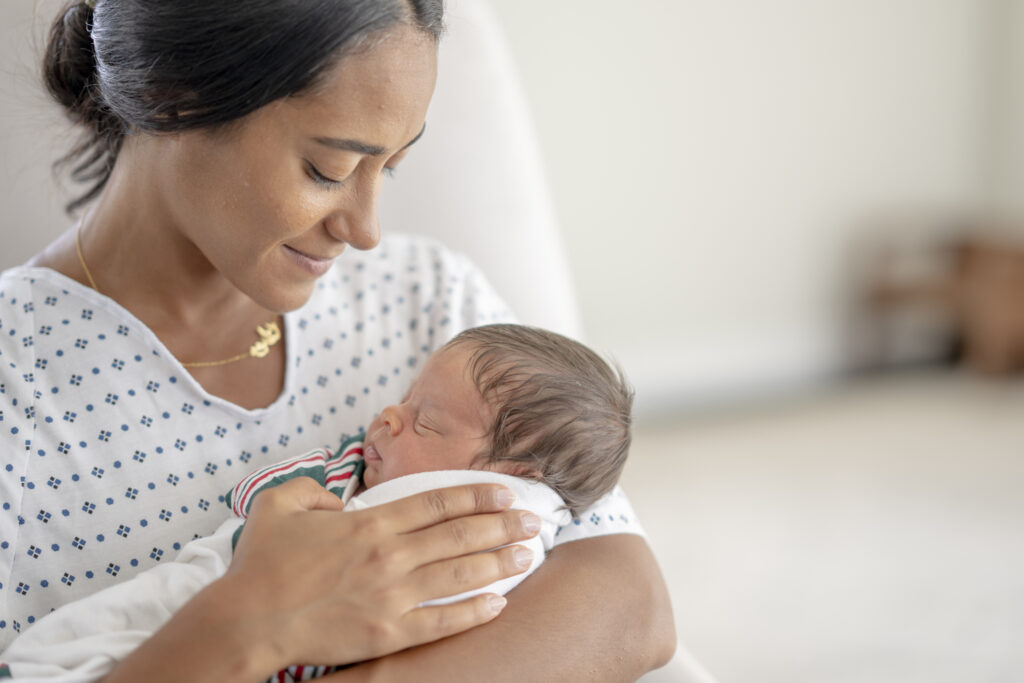The United States is facing a maternal mortality crisis. Rising maternal mortality rates in states have far reaching consequences for the health and well-being of women, children, and their families. States are grappling with a number of factors in their efforts to improve access to quality care for this population and strengthen the systems serving them.
Through the Maternal and Child Health Policy Innovation Program (MCH PIP), funded by the Health Resources and Services Administration’s Maternal and Child Health Bureau, the National Academy for State Health Policy (NASHP) is conducting a two-year policy academy (April 2021-March 2023) for up to eight states. Each state’s team should include representatives from Medicaid agencies, public health agencies, and other state stakeholders (e.g., mental health/substance use agencies, child welfare agencies, provider groups, Medicaid managed care plans, etc.) to build state capacity to address maternal mortality for Medicaid-eligible pregnant and parenting women.
Participating states will identify, develop, and implement policy changes or develop specific plans for policy changes and/or strategies with the ultimate goal of improving access to quality care. They will receive group and individual technical assistance to improve health care delivery systems and related supports for Medicaid-eligible pregnant and parenting women, with a particular focus on implementing policies or health system transformation that address racial disparities in maternal mortality.
More details about the policy academy and NASHP’s application process are provided below. State officials interested in participating in the academy must contact Eddy Fernandez at efernandez@nashp.org by Monday, Jan. 25, 2021, to receive the application materials. All state applications must be submitted by 5 p.m. (ET) on Friday, Feb. 26, 2021.
Expected Outcomes
The policy academy is designed to support states in implementing policy innovations that improve access to care for pregnant and parenting women through health care system transformation. As a result of participating in the academy, states will:
-
- Identify and clarify areas in need of change related to improving access to care for pregnant and parenting women to build state capacity to address maternal mortality;
- Select an overall goal for the two-year project period based on the identified areas of need,
- Identify policy innovations and strategies to achieve the state’s goal;
- Receive individual technical assistance (TA) from NASHP and other experts in support of state MCH policy innovations;
- Receive and participate in group TA, including state-to-state calls and annual meetings to learn from and share relevant experiences with other participating states;
- Implement the policy change or develop a specific plan for implementing the policy change to support access to quality health care services and supports for Medicaid eligible pregnant and parenting women;
- Strengthen partnerships with other sectors and convene multidisciplinary teams (e.g., Medicaid, public health, mental health, substance abuse prevention); and
- Receive support in aligning with other state efforts/initiatives that are designed to provide access to quality health care services and supports to improve maternal health outcomes.
Focus: Building State Capacity to Address Maternal Mortality and Increase Access to Quality Care for Pregnant and Parenting Women
Pregnant and parenting women face challenges accessing quality care that have been heightened due to the COVID-19 pandemic. To facilitate access to quality care and improve maternal health outcomes, states may consider implementing policy innovations and changes to improve health care delivery, payment, coverage, and quality for systems of care for Medicaid-eligible pregnant and parenting women, as well as strategies to enhance collaboration across systems.
States may leverage existing Medicaid health system transformation efforts, including health homes, medical homes, accountable care organizations, or other innovative models (e.g., Centering Pregnancy and reimbursement for birth centers), which are designed to support coordinated and comprehensive care. States may also need to take extra steps to ensure there is an adequate workforce to serve this population and that existing providers have the capacity to effectively deliver and coordinate care.
Additional priorities may be identified as part of the state’s application and project planning processes. States should also consider disparities and inequities in access to care and outcomes among Medicaid-eligible pregnant and parenting women regardless of their selected areas of focus.
State Team Requirements
Each state team must meet the following criteria:
- Identify three to five team members with roles or expertise that would be beneficial to the state’s identified goals/priorities, including the following representatives:
- Required team members: State Medicaid agency senior staff member (required team lead) and other key Medicaid staff (e.g., managed care lead, etc.), state Title V MCH program director or designee
- Optional team members: State mental health/substance use agency lead on women’s health, state child welfare agency, Maternal, Infant, and Early Childhood Home Visiting Program director, epidemiologist or data specialist, state legislator/staff, nonpartisan researchers, and representatives from provider groups, Medicaid managed care plan(s), consumers/families, community organizations, and others.
- Have the capacity to receive TA and participate in collaborative learning, including regular check-in calls and webinars, a listerv, and annual meetings (NASHP will support travel for up to three state team members; states may bring up to two additional team members at the state’s expense);
- Have a state commitment to addressing maternal mortality among Medicaid-eligible pregnant and parenting women, advancing health care system innovations for MCH populations, and addressing racial disparities in maternal health outcomes; and
- Demonstrate a history of (or commitment to future) cross-agency collaboration.
Policy Academy Timeline
| Actions | Date |
| Call for applications released | Jan. 12, 2021 |
| Deadline for states to request application materials | Jan. 25, 2021 |
| State applications due to NASHP | Feb. 26, 2021 |
| Selected state teams notified | March 2021 |
| Policy academy kick-off call | April 2021* |
| Targeted TA, peer-to-peer webinars and calls | April 2021 – March 2023 |
| Annual in-person meetings | August 2021 and August 2022* |
*Exact dates will be confirmed at a later date as well if the annual meetings will be virtual due to COVID-19.
Application Process
- Email Eddy Fernandez (efernandez@nashp.org) by 5 p.m. (ET) on Monday, Jan. 25, 2021 to indicate your state is interested in NASHP’s MCH PIP Policy Academy. The email should include your state’s team lead and/or key point of contact, and their contact information (title, agency, work phone, and email).
- After emailing to express interest, a state team lead/key contact will be provided with a brief application. Each state team must complete this application and submit it to Eddy Fernandez (efernandez@nashp.org) by 5 p.m. (ET) on Friday, Feb. 26, 2021.
- NASHP will review states’ applications and select states to participate in the policy academy. All states that applied will receive notifications in March 2021.
Any questions about MCH PIP, the policy academy, or NASHP’s application process should be directed to Eddy Fernandez (efernandez@nashp.org).



